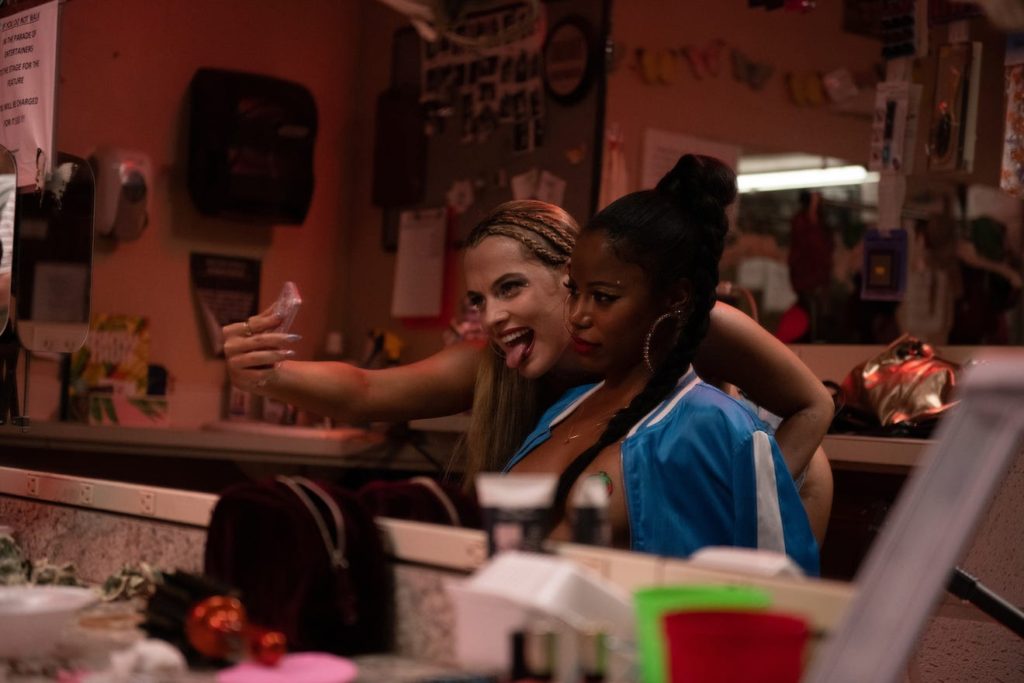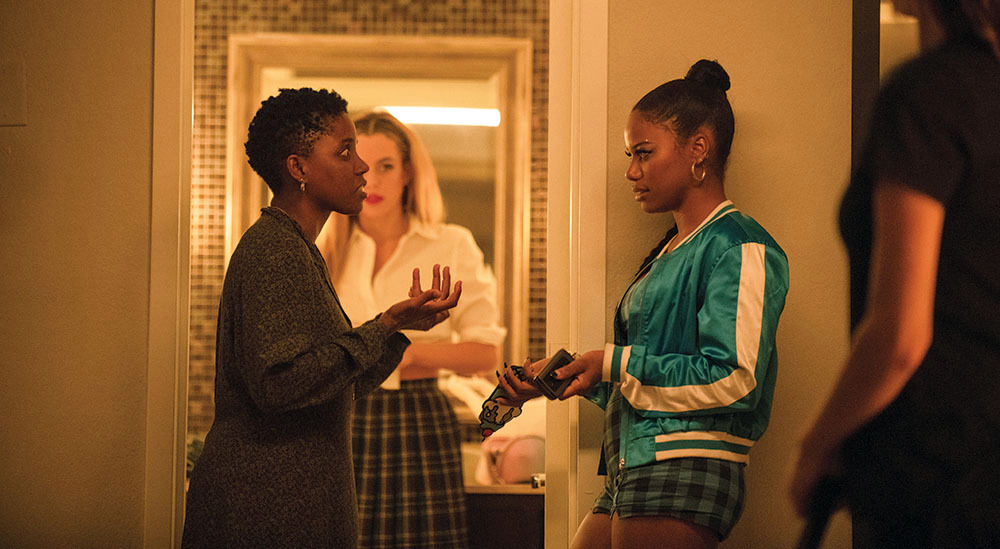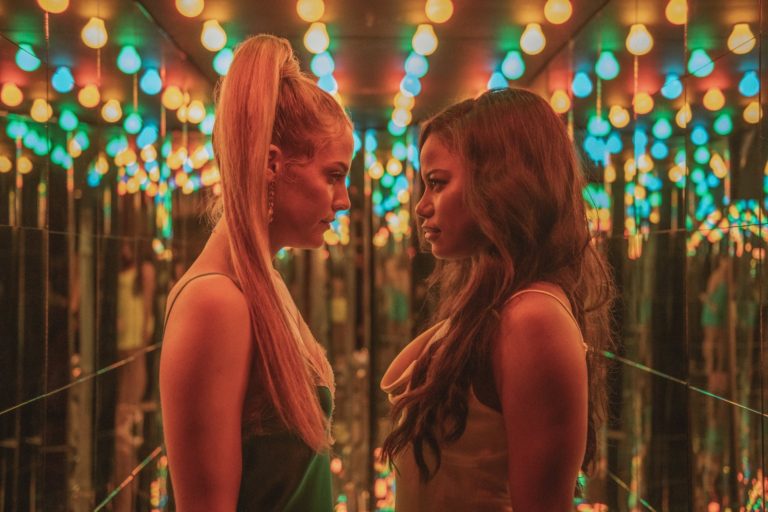Zola (2021 | USA | 96 min. | Janicza Bravo)
A film that, true to its origins, is “full of suspense” while also being remarkably well crafted on all levels, Zola is without a doubt the best film of the summer thus far.
Anyone with passing knowledge of legendary stories told on Twitter will be familiar with the origins of Zola. The film comes from the true story of a chaotic weekend recapped by none other than A’Ziah “Zola” King (@_zolarmoon) in a massive viral 148-tweet thread. It caught the attention of filmmakers who saw its potential to be compelling cinematic adaptation. After seeing the result, it is clear they were right.
It follows Zola, played by an outstanding Taylour Paige, who is working a boorishly bland shift at a Hooters-esque restaurant when she meets Riley Keough’s Stefani, a seemingly nice woman who will soon become a force of destruction in her life. After only knowing each other for a short time, Stefani invites Zola to come on a road trip to Florida with the promise of big money to be made from stripping at a club. Zola agrees, leaving her boyfriend behind and hitting the road with a group of almost complete strangers. Zola calls attention to this in one of many humorously incisive internal monologues, reflecting the nature of a running Twitter thread of storytelling, when she remarks that it will be a long time before she even learns the driver’s name.
The trip seems initially joyous as the traveling companions listen to music and have a good time dancing around in their vehicle. There is Stefani’s boyfriend Derek, played by Succession’s own Cousin Greg aka Nicholas Braun, and the aforementioned mystery man who is captured perfectly by the remarkable character actor Colman Domingo. It all seems perfectly swell at first, an adventure to break up the mundanity of everyday life. However, Zola begins to get visibly uncomfortable and uncertain about the whole journey.
Upon arriving, it becomes immediately clear that the promised riches were vastly over-exaggerated. The club where Zola dances is not just dingy, it is downright depressing. Despite that, Stefani seems overjoyed that Zola is there with her. At one moment, Stefani takes Zola’s phone and begins taking a suspiciously large amount of photos of the two of them together backstage at the club. Zola tells her to stop and seems alarmed, though lets it go in the hopes of just getting to go home.

Zola soon realizes that she was brought under false pretenses and is now trapped in a situation that is as awkwardly uncomfortable as it is potentially dangerous. To know as little as possible is ideal for this film so as to better inhabit Zola’s shoes and see the world through her eyes. It is that aspect, the feeling of its main character, that the film does the most outstanding job of portraying.
Everything feels so delicately designed and expertly constructed to maximize tension so that the film feels painfully authentic. Every new development and situation feels bizarre, though no less grounded. All credit must go to co-writers Janicza Bravo & Jeremy O. Harris who took a lengthy Twitter story to the silver screen with absolute precision. No scene feels wasted, no glance or aside out of place. The development of the story and the puzzle pieces all coming together reveal so much about Zola in such a subtle fashion.
That is where looking to Bravo, who also directed the film, is most informative about what makes it all work so well. Her first film, 2017’s absurdist dramedy Lemon, was a brilliantly misunderstood debut. One can see fingerprints of her prior work all over her vision for her vibrant second feature, which is both surreal yet deeply serious.
A repeated motif of Zola speaking to herself in a mirror about the situation and who she wants to be, provides a visual representation of her interior uncertainty. It serves as an escape for both Zola and the audience who are experiencing sympathetic fear for her safety. Bravo juxtaposes these moments with hard cuts to bring the audience back to Zola’s dour reality. It is consistently effective and a device Bravo used in Lemon, often cutting moments harshly short to cause an abrupt unsettlement.

Throughout, Bravo employs visual flair and cinematic panache that stick out as exactly the type of grandiose filmmaking the ambitious story needed. One such moment sees the characters pull up to a motel where two young boys are playing basketball on an upper floor overlooking them. The bouncing of the basketball takes on a strange rhythm of just the same two bounces over and over and over again. It is as if the world has momentarily glitched, leaving the duo stuck in an endless loop. It feels like a fairytale that will soon become a nightmare.
Bravo and editor Joi McMillon, who worked with the director on Lemon as well as several short films, drop this moment of temporal distortion just before things begin to get really bad. Frequent interjections and breaks in the presentation remind you that the original story is all based on a Twitter thread. When paired with an unconventional though no less fitting score by the multitalented Mica Levi that mimics the notifications of a phone, it really draws you into a distinct world.
Such a world would still not be an engaging one without a compelling cast to inhabit it. In that regard, Zola does not miss a beat. In particular, Paige gives what initially seems like the quietest performance, though her every glance and subtle acting decision speaks volumes. As Zola just tries to survive the next few days and get out in one piece, Paige is simply perfect in every single scene. Even though the experience is horrible, she brings both humor and grace to the role. Paige ensures Zola never gets lost in her own story despite being among so many strange people she has found herself traveling with who are far more over the top.
Among the bizarre menagerie of her costars, Domingo absolutely steals every single scene. He is both volatile and full of rage while still being darkly funny despite himself. That mix of absurdity and fear create a unique cocktail of a character that is hard to shake. Keough and Braun give similarly career-best performances as an emotionally unhealthy couple fraught with problems. They provide so many uncomfortable moments that only get worse as the film goes along that you can’t help but feel a crushing sense of secondhand embarrassment on their behalf.

If there was anything that creates a hangup in the film it would be some aspects of the finale. Toward the end, the choice of a select Run The Jewels track, who I would normally enjoy hearing doesn’t quite fit and is a missed opportunity with a composer like Levi on board. The conclusion itself is also somewhat abrupt, ending in a fashion where many loose threads feel unresolved. However, that is not just forgivable but understandable in the context of the real life story.
For Zola, or anyone unlucky enough to find themselves caught in an unbelievable mess, the only way this story could end peacefully is for it to conclude as quietly as possible. The sense that the ending is abrupt is a product of that downshift in intensity. What was high stakes and borderline dangerous ends so simply that it leaves on a melancholy note. On a second viewing, the ending even becomes more movingly poetic and downright sorrowful. It is an impressive accomplishment to capture such profound emotions in a film that is still no less “full of suspense.”
Zola walks a narrative tightrope and makes it look easy, creating a wholly moving experience that is emotionally resonant and still thoroughly entertaining.
Zola is out now in theaters.




